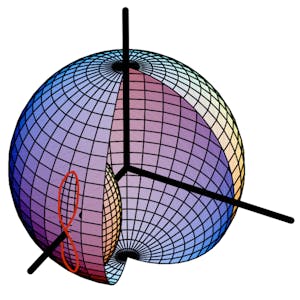This course, offered by University of Colorado Boulder, delves into the programming of specific orientation and achieving precise aiming goals for spacecraft moving through three-dimensional space. By covering stability definitions of nonlinear dynamical systems and the application of Lyapunov's Direct Method, you'll gain a deep understanding of nonlinear 3-axis attitude pointing control law development. Additionally, you'll explore alternate feedback control laws and closed-loop dynamics.
Throughout the course, you'll differentiate between a range of nonlinear stability concepts and apply Lyapunov’s direct method to argue stability and convergence on a variety of dynamical systems. You'll also develop rate and attitude error measures for 3-axis attitude control using Lyapunov theory, and analyze rigid body control convergence with unmodeled torque.
Certificate Available ✔
Get Started / More Info
This course is structured into four modules. Module 1 covers nonlinear stability definitions, Module 2 delves into Lyapunov Stability Theory, Module 3 explores attitude control of states and rates, and Module 4 focuses on alternate attitude control formulations.
This module introduces the course and provides an overview of nonlinear stability definitions. It covers the difference between local and global stability, analyzes and applies Lyapunov's Direct Method to prove stability properties, and develops a nonlinear 3-axis attitude pointing control law using Lyapunov theory. The module concludes with optional review sessions and concept checks to reinforce learning.
This module delves into Lyapunov Stability Theory, providing an overview of definite functions, Lyapunov function definition, and applications of global stability. It explores Lyapunov stability of linear systems, as well as state-based Lyapunov functions and their applications. The module also includes optional reviews and concept checks for comprehensive understanding.
This module focuses on attitude control of states and rates, covering topics such as nonlinear rigid body state and rate control, global stability of nonlinear attitude control, unmodeled disturbance torque, and feedback gain selection. It also includes concept checks for the application of learned concepts.
In this module, you'll explore alternate attitude control formulations, including Lyapunov optimal control, numerical control simulation, linear closed-loop dynamics, and RW feedback control law. The module also includes an optional review and a final assignment to solidify the understanding of nonlinear control.
Spacecraft Dynamics and Control provides comprehensive training in kinematics, kinetics, and nonlinear control for spacecraft motion, with a focus on achieving precise...
Partez à la découverte de l'infiniment grand et de l'infiniment petit dans ce cours fascinant qui explore leur présence insoupçonnée dans notre quotidien.
The Science of the Solar System course explores the latest discoveries and theories in solar system science, providing a challenging yet rewarding learning experience....
Learn about modern topics in condensed matter physics, including superconductivity, fractionalization, topology, and non-equilibrium phases.